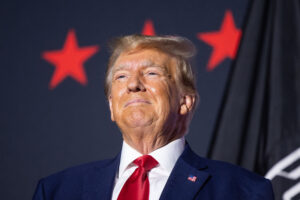For years now, American conservatives have been engulfed by an intellectual civil war, with various shades of the “New Right” fighting to overthrow “Conservatism Inc.”. What is less well-understood, however, are the changes taking place on the centre-left: the broad liberal plain where much of the American establishment sits (as distinct from the self-identified Left proper, who have lost much of their Bernie-era energies and are now sliding back into political obscurity).
Since the liberal centre is the establishment, the institutions and personnel who comprise it do not tend to think of themselves as belonging to any particular school of thought: their worldview usually forms the official common sense. There is no “liberal movement” like there is a conservative one, and the kind of sectarian squabbling over dogmas and heresies that is so common on the Right is rarer on the centre-left.
The paradox is that the establishment often has less of a functional gatekeeping capacity and is vulnerable to sudden ideological capture from below: this is how the social justice movements of the 2010s became so influential. Despite Barack Obama’s warnings against identity politics and Joe Biden’s rejection of “Defund the Police”, radical ideas remain entrenched in institutions. The hegemony of DEI in corporate and academic settings, the outsize importance of gender ideologies in the liberal idiom, and the sway of dysfunctional pseudo-humanitarian responses to crime and immigration in big cities illustrate just how incomplete the liberal pushback against runaway cultural progressivism has been.
Yet the liberal establishment is not entirely hopeless. When it comes to economics and governance, it has an enviable penchant for pragmatism and reinvention. While pundits foresaw a return to Third Way Clintonism under Joe Biden, the octogenarian president instead favoured an open repudiation of the Washington Consensus and a sweeping programme of re-industrialisation — which, though imperfect, remains more advanced than what Republicans are offering by way of governance: an endless return to Reaganomics.
Liberalism’s challenge is in staying on this economic course while tamping down on the recurrent cultural excesses of its activist base. Despite what the culture warriors may say, the new American centre is economically to the Left of Reagan-Clinton globalism but culturally “live-and-let-live”: voters care about bringing jobs and factories back but have little time for hardliners on both ends of the culture war.
There are a number of Democratic candidates and elected officials who — whether or not they conceive of themselves as inheritors of the liberal torch — represent new and heterodox approaches to centre-left politics. Taken together, they may hold the secret to building a future liberal majority for a post-globalised, post-culture war America.
One of the most promising Democratic candidates for high office is Lucas Kunce of Missouri, who is running a populist campaign for US Senator in that reliably red state. Kunce’s opponent is Josh Hawley, an incumbent who was considered future president material until a video of him raising his fist in solidarity with January 6 rioters put him beyond the pale of respectability for many. Kunce has capitalised mightily on Hawley’s flaws, contrasting his working-class roots against Hawley’s affluent background, as well as his 13-year service in the Marines against Hawley’s lack of a military record.
With even greater success, Kunce has mocked a core part of Hawley’s public persona: his preoccupation with masculinity. Hawley wrote a book about masculinity, yet, as Kunce is fond of reminding Missourians, security footage exists of the Senator running away from the very mob he incited on January 6, highlighting the hollow, performative nature of Hawley’s (and the cultural Right’s) promotion of masculine identity. Kunce also has taken issue with the moralising tone of Hawley’s polemics, in which he decries men for playing video games among other innocuous hobbies. But as Kunce has pointed out, video games were one form of R&R that soldiers like himself used to take up in between missions in Iraq, something his opponent wouldn’t know about.
This approach to masculinity is potentially fertile ground for Democrats, who tend to sidestep the issue. It offers a middle way between the scarcely concealed misandrist impulses of progressive gender ideology, with its fixation with “toxic masculinity”, and the crude Neanderthal caricature of masculinity that’s gained currency in Right-wing circles, with its fetishisation of aesthetics and body-building over moral substance. Instead, Kunce models a wholesome masculinity that fuses a quiet self-confidence with an earnest boy scout’s sense of social responsibility. This combination may be just what the Democrats need to break through in red areas while also gaining ground with the one political species they were never able to fit into their rainbow coalition: the straight, white, working-class male.
In many ways, Kunce is carrying on from where candidates such as John Fetterman and Tim Ryan left off. Their unconventional campaign styles similarly elided the usual identitarian divisions. Like Kunce, the ideal male Democrat will be just as comfortable marching in the Pride parade of a big city as he will be hanging out with plaid-clad farmers in the countryside.
Just as American liberalism will have to recognise the need for positive masculinity in order to compete with the Right on its own terrain, so too will it have to accept the case for positive nationalism. That may be a difficult adjustment for some on the centre-left who were raised to believe in the ideals of a borderless globe and a post-national future. But two Democrats are making a different case: Representative Ro Khanna and Senator Chris Murphy are each seeking to provide a philosophical basis for the party’s shift away from globalisation and toward a new pro-development outlook that affirms the centrality of the American nation-state in a competitive and often hostile global environment.
Khanna was a strong Bernie Sanders supporter but never identified as a socialist — and how could he, as the House member representing Silicon Valley? Instead, Khanna calls his philosophy “economic patriotism” and grounds it in the tradition of Hamilton and FDR: it is about reversing “decades of misguided free trade and financialisation”, and restoring America’s “role as a workshop of the world”. Khanna believes that Washington policymakers erred when they “just stopped caring about production” and has worked across the aisle with Senator Marco Rubio to propose an economic development council to coordinate industrial and labour policy. Where Khanna parts ways with his Right-populist colleagues, however, is in his desire to attach progressive priorities, such as childcare or free public tuition, to the re-industrialisation agenda. This is an approach that liberal columnist Ezra Klein has criticised as “everything-bagel liberalism” that will slow down re-industrialisation. In any case, debating the best way to execute industrial policy is far better than not caring about the issue at all, which has been the default position of the last generation of Democrats and Republicans.
Unlike Khanna, Chris Murphy hasn’t been shy about calling his stance “economic nationalism”. In a notable Atlantic essay entitled “The Wreckage of Neoliberalism”, the Connecticut Senator last year presented a somewhat more thoughtful rendition of the same basic position that Khanna holds. Going beyond the economic arguments, Murphy touched on the deeper cultural and human-level consequences of the globalised order of the last 40 years, with its brutal displacement of family, community, and all other rooted social identities at the hands of unfettered markets and technology. (On this note, he sounds closer to Republican fellow Senator, J.D. Vance.)
Murphy has since released a “National Strategy for Social Connection” to restitch the bonds of American society amid an epidemic of loneliness and atomisation, and has even sought to extend his message to those normally outside the Democratic coalition. In a remarkable tweet that no other national Democrat would likely have sent, Murphy wondered aloud whether the time had come for his party to start courting social conservatives and to accept “intra-movement friction on culture issues as a consequence”. He put up a poll and predictably the responses were mostly negative-to-indignant, with 77% against the idea. But Murphy was asking the right question — and indeed, social conservatives were once part of the Democratic coalition before abortion became the central cleavage in US politics.
Elsewhere, if there is one setting where Democrats need to step up, it is not so much in the halls of Congress as in their own political heartlands. That is America’s big cities, which have seen multiple crises of governance in everything from crime to homelessness to immigration and basic liveability. And there has been no one more proactive in addressing these issues than New York City’s mayor, Eric Adams.
Thanks to his ideological positions, Adams has already gained a strong national platform. A working-class African-American ex-cop, he ran on an anti-crime agenda, promising to crack down on offences large and small. Adams’s initiatives on the homelessness issue — such as the involuntary commitment of mentally ill vagrants — have put him at odds with progressive activists, while his strident rhetoric on the need to stop the influx of foreign migrants has led the New York Post to describe him as an “immigration restrictionist”. Democrats in other parts of the country can learn a simple lesson from this: namely that citizens look to their government to keep the peace and civil order on their streets and on their borders, without which progress is not possible.
To be clear, none of the Democrats examined here entirely encapsulates the current state of American liberalism. Their heterodox approaches to issues are still far from the new common sense. But between Kunce, Khanna, Murphy, and Adams, there is enough material to remake the Democratic Party into a more formidable and competitive political force, one that can deliver on economic reform while suppressing the worst instincts of cultural progressivism and stealing the populist-nationalist thunder of Maga-ism.
And Democrats may soon discover that a campaign of internal “de-wokeification” (to borrow Senator Vance’s expression) is their best bet against the GOP, since the Right has no positive unifying agenda beyond anti-wokeness. Removing “woke” could actually shatter the false unity that currently holds Republicans together and trigger a larger political civil war between the genuine economic populists in the party and the holdover Reaganite leadership. Meanwhile the centre-left can claim the new political centre and build an enduring liberal majority. Should it ever happen, Democrats can look forward to repeating in the Twenty-Thirties what they achieved in the Nineteen-Thirties, and liberalism’s happy days will be here again.
Disclaimer
Some of the posts we share are controversial and we do not necessarily agree with them in the whole extend. Sometimes we agree with the content or part of it but we do not agree with the narration or language. Nevertheless we find them somehow interesting, valuable and/or informative or we share them, because we strongly believe in freedom of speech, free press and journalism. We strongly encourage you to have a critical approach to all the content, do your own research and analysis to build your own opinion.
We would be glad to have your feedback.
Source: UnHerd Read the original article here: https://unherd.com/




